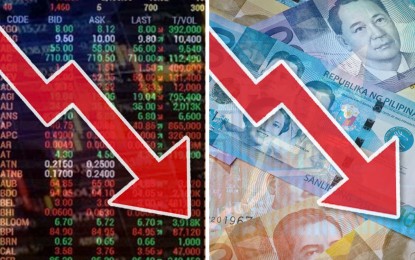
IMPACT. Concerns for hits in US' banking system following the collapse of Silicon Valley Bank continue to dampen investors' sentiments, resulting in the negative close of the local bourse's main index and the peso on Tuesday (March 14, 2023). Economists said investors are bracing for more volatile trading in the next days. (PNA file photo)
MANILA – Fears over the impact of the United States-based Silicon Valley Bank’s collapse continued to dampen market sentiments, resulting in another decline of the Philippine Stock Exchange index (PSEi), which the peso mirrored.
The main equities index shed 2.31 percent, or 151.12 points, to 6,393.33 points.
All Shares trailed after it declined by 1.83 percent, or 64.35 points, to 3,454.48 points.
All the sectoral counters also ended the day in the negative territory, led by the Holding Firms index after it went down by 2.52 percent.
It was followed by Property which decreased by 2.14 percent; Industrial, 2.12 percent; Services, 1.96 percent; Financials, 1.86 percent; and Mining and Oil, 0.84 percent.
Volume totaled 968.01 million shares amounting to PHP6.78 billion.
Decliners led advancers at 143 to 49 while 47 shares were unchanged.
“Philippine shares fell below the 6,500 support as investors bet the collapse at Silicon Valley Bank could be the start of more banking headwinds in the US,” said Luis Limlingan, Regina Capital Development Corporation (RCDC) head of sales.
Oil prices slipped due to “volatile trading on Monday as the collapse of Silicon Valley Bank roiled equities markets and raised fears of a fresh financial crisis.”
However, Limlingan said this development was countered by a “recovery in Chinese demand.”
Brent crude oil future fell by 2.4 percent to USD80.77 per barrel and the West Texas Intermediate (WTI) by 2.5 percent to USD72.30 per barrel.
Meanwhile, the peso weakened against the greenback after ending the day’s trade at 55.08 from the previous session’s 54.93.
It opened the day flat at 55.05 and traded between 55.14 and 54.88. The average level for the day stood at 55.025.
Volume reached USD1.13 billion, up from the previous day’s USD1.07 billion.
In a commentary, Rizal Commercial Banking Corporation (RCBC) chief economist Michael Ricafort traced the peso’s weakness to the upward correction of the US dollar against major currencies, further widening of the Philippines’ trade deficit last January to USD5.74 billion and the drop of the PSEi partly due to similar path of its US counterparts.
These were partly countered by the decline of oil prices in the international market, which is expected to help ease inflationary pressures and the country’s trade deficit.
For Wednesday, the local currency is seen to trade between 54.95 to 55.15 against the US dollar. (PNA)
